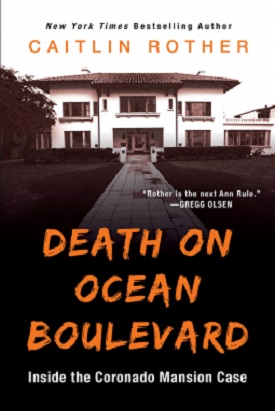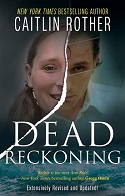 Caitlin Rother, the New York Times bestselling author of true crime books and one of my all-time favorite authors, graciously agreed to be my guest again today.
Caitlin Rother, the New York Times bestselling author of true crime books and one of my all-time favorite authors, graciously agreed to be my guest again today.
Her new book is Death on Ocean Boulevard: Inside the Coronado Mansion Case, an examination of two deaths. The 911 call came on the morning of July 13, 2011, from the historic Spreckels Mansion, a lavish beachfront property owned by pharmaceutical tycoon Jonah Shacknai. The body of his girlfriend, Rebecca Zahau, was discovered by sheriff’s deputies who responded to the scene. She was nude, gagged, her ankles were tied, and her wrists were bound behind her. Jonah’s brother, Adam, claimed he found Rebecca hanging from the second-floor balcony off a guest bedroom, the door to which was painted with this cryptic message:
SHE SAVED HIM
CAN YOU SAVE HER
Was it a suicide note or a killer’s taunt?
Rebecca’s death came just two days after Jonah’s son, six-year-old Max, took a devastating fall while in Rebecca’s care. Authorities ruled Rebecca’s death a suicide, motivated by her guilt. Her family maintains that she would never have taken her own life, and certainly not in that manner. They insist she was murdered.
In Death On Ocean Boulevard, Caitlin, whose own husband committed suicide by hanging, offers an objective, but uniquely personal look at the evidence and theories in the case.
How and Why I Write True Crime Books
People often ask me, how do you handle the darkness of writing true crime books? How do you sleep at night with all those violent images in your head?
The simple answer is I don’t have violent images in my head because I don’t want them there, nor do I (generally) put them into my books. I find graphic gory details to be gratuitous and sensational, and I don’t want to glorify murder or killers in any way. I just want to understand them.
So, that’s the way I approach these stories — and what draws me to the ones I choose to stick with for the years it takes to put a good nonfiction book together. I come from both a psychological and an investigative standpoint.
That means I dig deeper than the information that came out in court or in the media, to solve the mystery and to answer the question why a suspicious death — or murder, as it may be — occurred. Then I share my findings, all woven into a suspenseful novelistic narrative, with my readers. I want them to be surprised how much they didn’t know about the case after reading about it or seeing it on TV.
But the more personal and complicated answer is that sometimes these cases choose me, which was the situation with my latest book, Death on Ocean Boulevard: Inside the Coronado Mansion Case, which is now available.
As I explain in this book, and in more detail in my mini memoir, Secrets, Lies, and Shoelaces, my husband committed suicide by hanging in a motel room in San Quintin, Mexico, in 1999 — twelve years before Rebecca Zahau was found dead in the rear courtyard of her wealthy boyfriend Jonah Shacknai’s mansion in Coronado, California, in 2011.
So, when the news hit that Jonah’s brother Adam called 911 to report that he’d found Rebecca’s body hanging naked, bound, and gagged from an exterior balcony and had cut her down before the police arrived, you can see why my interest was piqued — on a personal and professional level. Even more so when I learned what he’d actually told the 911 dispatcher, “I got a girl, hung herself in the guest house,” where he’d stayed the night.
Given the state of Rebecca’s body — naked, gagged, her hands tied behind her back, and her ankles bound — the public’s immediate reaction was that this was a murder. Rebecca’s family and many other people still adamantly believe that to this day, saying there’s no way a woman, and Rebecca, in particular, would have committed suicide in such a public and elaborate way.
Although the San Diego County Sheriff’s Department (SDSD) investigated this “suspicious” death as a homicide, the agency ruled her death a suicide less than two months later, after toxicology tests revealed there were no drugs in her system.
That meant I couldn’t write a book about this bizarre and unusual case for liability reasons, because no one had been arrested or charged with a crime, let alone convicted of one.
When people asked me if I was going to write a book about “the Coronado mansion murder,” I’d have to say no, because according to law enforcement, it wasn’t a crime and I could get sued if I accused anyone of killing Rebecca.
Nonetheless, people brought me information and investigative files, which I collected quietly, waiting to see if the case would reach the courts. To be honest, this case scared me. The parties were litigious and/or wealthy, and some were potential suspects in the public eye. Also, if Rebecca was murdered, then the killer was still out there. I literally feared for my own safety.
That changed somewhat after the Zahaus filed a civil case in 2013, accusing Adam Shacknai and two women who were later dropped from the case (details are discussed in the book) of scheming to kill Rebecca and hang her from the balcony. The case took another five years to go to trial, where a jury ultimately found Adam responsible for Rebecca’s death, which freed me up to write about it.
That is when my research went into hyperdrive. I’d been following the case since the beginning, and attended every day of the trial. Now it was time to investigate all the leads I’d been given, and explore the unanswered questions that went unresolved in the sheriff’s investigation and remained even after the trial.
This was no simple investigation, mind you. I was told many, many crazy theories, read more of them online, and went down quite a few rabbit holes trying to find the truth, only to discover that there was no there there. Many were based on speculation, false information, and conspiracy theories. Once I weeded through them, I presented only the best and most credible ones in the book, using my own experience with suicide as a lens to examine this case.
The major reason why I enjoy writing these books — and why readers tell me they buy them — is because we all want to know why. We all want to know the answers to those nagging questions that law enforcement doesn’t or can’t answer, and in this case there are plenty of them.
For me, it’s like solving a puzzle as I gather clues and insights that were missed or ignored by the authorities. The urge to try and figure out what really happened is a powerful driving force.
In Death on Ocean Boulevard, I’m revealing all the information I have learned and can legally present to readers about this case. But the ultimate question of whether it was a murder or suicide will be up to you . . . Another law enforcement agency or even the SDSD — if Sheriff Bill Gore loses the next election — may ultimately decide to re-open this criminal case, or may be forced to do so. The Zahaus have filed a second lawsuit, this time against the SDSD, with a trial set for mid-October 2021.
As we say in the news biz, this case has legs.
Meet Caitlin

Caitlin Rother was an only child who entertained herself “by reading stacks upon stacks of books and using my mind as a stage where characters talked to each other.”
She holds a bachelor’s degree in psychology from the University of California, Berkeley, and earned her master’s degree from the Medill School of Journalism at Northwestern University. In high school and college, she explored journalism, but opted for a career in public relations with a San Francisco cruise line. Eventually, though, she was compelled to choose the “balance and objectivity of newspapers over the positive spin world of PR, marketing and advertising, . . . ”
It was not until the late 1980s that she joined a writing workshop in Northampton, Massachusetts, in her quest to write more in-depth, creative stories while toiling as a reporter with the Springfield Union-News. The series of short stories produced in that workshop eventually evolved into her first novel, Naked Addiction.
As an investigative journalist, Caitlin was drawn to “complex and dramatic stories – the most bizarre or tragic deaths and the public figures whose questionable actions evoked my investigative curiosity.” She wrote about Michael Jackson’s original molestation charges and addiction to painkillers, the lifestyle of the Heaven’s Gate cult and strippers’ laundered political contributions to San Diego City Council members, and developed expertise in addiction (alcohol and methamphetamine, suicide, mental illness and the family dynamics and pharmacology involved).
She expanded a series of news stories about the Kristin Rossum murder case into what would become her first true crime book, Poisoned Love.
In 1998, Caitlin was nominated for a Pulitzer Prize by the Union-Tribune. Her story about a depressed teenager who died after lighting himself on fire behind a WalMart won three awards in the annual Best of the West contest. Her journalistic honors also include a Best Feature award from the Associated Press News Executives Council and Best News-Feature award from the Los Angeles Press Club.
In 2006, she contracted to draft her second non-fiction book and, in a risky leap of faith, left the security of her position with The San Diego Union-Tribune behind.
Today Caitlin is also the New York Times best-selling author of Lost Girls, Dead Reckoning, and Then No One Can Have Her. Additionally, she penned A Complicated Woman, one of three entries in Greg Olson’s Notorious USA series, and authored Hunting Charles Manson with Lis Wiehl. Her other books include Deadly Devotion/Where Hope Begins; My Life, Deleted; Body Parts; Twisted Triangle; and I’ll Take Care of You, the story behind the love triangle murder of Newport Beach multimillionaire inventor Bill McLaughlin by his fiancee, Nanette Packard, and her NFL-playing lover, Eric Naposki.
Caitlin is a sought-after speaker who also helps aspiring authors as a book doctor and writing/research/promotions coach and consultant. She teaches narrative non-fiction, digital journalism, and author branding/promotions at the University of California, San Diego, Extension and San Diego Writers, Ink.
Connect with Caitlin via her website, or on Facebook, Twitter or Instagram.



















Comments are closed.